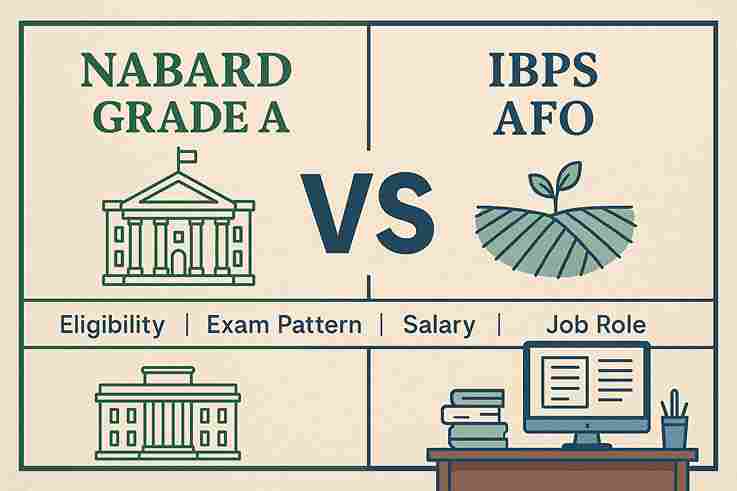One evening last year, I sat in a chair and talked to my friend Arvind. Arvind cleared both the exams, NABARD Grade A and IBPS AFO, in just one year. When I asked him, “Bhai, what is the difference between NABARD Grade A and IBPS AFO?” There was a sparkle in his eyes. He told me how he enjoyed desk-based policy-making but got a different kind of satisfaction by solving farmers’ problems while making field visits.
As soon as I heard his story, I understood that this is not just a job comparison—these are two different lifestyles, responsibilities, and growth paths. Arvind shared every step of his preparation journey to the interview hall:
- How NABARD’s descriptive papers polished his writing skills,
- And how IBPS AFO’s MCQS tested his core agriculture understanding,
- How he maintained a balance between policy drafting and ground-level interaction with farmers.
In this blog, I will share Arvind’s real experiences with you so that you get a clear understanding of every aspect of the NABARD Grade A and IBPS AFO exam pattern, work profile, salary, and career growth. Come on, let’s start a journey that is not just based on theory but on real-life insights!

Difference between NABARD Grade A and IBPS AFO
The difference between NABARD Grade A and IBPS AFO is that both are prestigious career options in the agriculture and banking sectors in India. But do you know the difference between them? If you are a student from an agricultural background or want to make a career in rural development, then this blog is for you! I, Khumesh Chaudhary, who is preparing for these exams myself, will compare the two and tell you which role will be better for you.
upcoming exam 2025
1. Exam Conducting Body
Additional Insights (From My Research & Friend’s Experience)
NABARD’s Prestige: Since NABARD is a premier development bank, its exams are considered more elite than IBPS AFO.
IBPS AFO’s Reach: IBPS conducts AFO exams for multiple banks (like SBI, PNB, etc.), so job postings can be anywhere in India.
Exam Transparency: Both follow fair processes, but NABARD interviews are more technical (focus on agriculture/rural economy).
2. Eligibility Criteria Comparison: NABARD Grade A and AFO Exam
Personal Insight from Arvind
I remember when I first checked eligibility, my OBC certificate verification was a little late. For IBPS AFO, the form window was wider, and I had the option of last-minute corrections on the portal — but for NABARD, you only have to upload once, so I proofread my form three times.
That’s why I always finalize the documents on the first day of application so that even a small mistake does not compromise my dream exam.
3. Difference between NABARD Grade A and IBPS AFO Exam Pattern Comparison
NABARD Grade A and AFO Preliminary Examination Comparison
Arvind’s Insight:
“I was initially overwhelmed seeing the eight sections in NABARD prelims, so I revised one section daily and practiced 30 MCQs. There are only three sections in IBPS AFO, so I focused on speed and accuracy through sectional mocks.”
NABARD Grade A and AFO Main Examination Comparison
Arvind’s Insight:
“The descriptive paper of NABARD Mains seemed the most challenging—I practised letter and essay writing for 2 weeks extra. The MCQS of the IBPS AFO mains were simple, but deep clarity was needed on professional knowledge—college notes were very useful.”
Interview (Personality Test) difference NABARD And AFO Jobs
Arvind’s Tip:
“The panel was friendly after the psychometric test in the NABARD interview—I showed confidence by sharing my rural project experiences. I was asked technical questions like details of the Soil Health Card and Kisan Credit Card schemes in the IBPS AFO interview.”
Takeaway:
- NABARD Interview: Keep your projects & attitude examples ready.
- IBPS AFO Interview: Keep technical agriculture schemes and terms fresh.
4. Difference between NABARD Grade A and IBPS AFO Syllabus
Prelims Examination Syllabus difference NABARD And AFO Jobs
Mains Exam Syllabus difference NABARD And AFO Jobs
🟩 NABARD Grade A Mains (Paper II)
Agriculture & Rural Development:
Soil and Water Conservation, Irrigation, Agroforestry
Animal Husbandry, Fisheries, Poultry
Agricultural Economics, Marketing
Farm Management, Post-Harvest Technology
Agri Finance & Credit Institutions
Rural Development Institutions and Programs (e.g., PM-KISAN, SHG, RRBs)
Economic & Social Issues:
Nature of Indian Economy, Globalisation, Inflation, Poverty, Employment
Govt Programs (MGNREGA, NRLM), Social Structure in India
Sustainable Development Goals (SDGS), Gender Issues
🟦 IBPS AFO Mains (Professional Knowledge)
Agronomy: Cropping Patterns, Soil Fertility, Weed Management
Horticulture: Fruit & Vegetable Science, Propagation Techniques
Animal Husbandry: Livestock Management, Poultry, Dairy
Plant Pathology, Entomology, Seed Science
Agriculture Current Affairs (Schemes, Acts)
Agri Finance & Marketing
Arvind’s Insight:
“In NABARD mains, both descriptive and analytical preparation has to be done—along with GS, understanding rural mindset is also important. In IBPS AFO, agricultural theory is deeply studied, but everything is objective. Notes + PYQs = lifesaver!”
5. Job Profile & Daily Work: NABARD Grade A vs IBPS AFO
🏢 NABARD Grade A: Job Profile
Key Responsibilities:
Appraisal of projects under RIDF, NABARD schemes, etc.
Sanctioning and monitoring of loans to co-operative banks/RRBs
Drafting reports on rural development programs
Liaising with state governments, ministries, and institutions
Monitoring agriculture and rural infrastructure projects
Planning and policy-related tasks in agriculture & finance
🗓️ Typical Day in NABARD:
“As soon as I came to the office in the morning, I had to see pending files and reports,” Arvind shares.
“Meetings are held with senior officers—a lot of it is paper-based, but impact-driven. Every week, once or twice, there was a field visit with some rural project or state official.”
🚜 IBPS AFO: Job Profile
Key Responsibilities:
Guide farmers on agri-loans, KCCS, crop insurance
Evaluate loan proposals and and farm visits for verification
Organise farmer camps & promote government schemes
Cross-sell agricultural banking products
Coordinate with the agricultural departments and the co-operative societies
🗓️ Typical Day in AFO Role:
“I used to check the loan papers of farmers of the branch since morning,” Arvind recalls.
“Every other day, I had to go to some farm or field for verification. Sometimes I used to feel that I was less of an officer and more of a farmer’s brother – there is so much ground connection.”
6. Salary and other benefits: NABARD Grade A vs IBPS AFO
Money matters, right? Especially when you’re preparing day and night, sacrificing your comfort, and dreaming of a secure and respectful career. Salary isn’t just about numbers—it’s about lifestyle, motivation, and recognition.
Arvind, who has worked in both roles at different times, gave us a real perspective:
“When I got the appointment letter in NABARD, I first saw the salary structure—it was quite good. But when I went into the field of AFO, the allowance there and the satisfaction of work with the farmer was also nothing.”
Difference between NABARD Grade A and IBPS AFO Salary
7. Career Growth & Promotions: NABARD Grade A vs IBPS AFO
When Arvind cleared both NABARD and IBPS AFO exams in different phases of his life, his biggest dilemma wasn’t just salary—it was “long-term growth”. He told us,
“Everyone has seen the starting salary, but the real difference is when the society comes after 5 years, your batchmate gets promoted to another level and you remain where you were…”
Career growth not only defines your future responsibilities but also your position, power, and perks. Let’s compare both on that ground.
Common Questions
Both are great opportunities, but NABARD Grade A is better for candidates interested in policy-level roles, development finance, and regulatory work. IBPS AFO suits those who enjoy fieldwork, direct farmer interaction, and want quicker promotions in public sector banks.
Yes, generally, NABARD Grade A is considered tougher due to its higher competition, broader syllabus, and fewer vacancies. However, with a good strategy, both exams are crackable.
No, NABARD Grade A is mostly an office-based job with occasional field visits during policy review or inspections. IBPS AFO involves more regular field interaction.
NABARD Grade A offers a higher initial gross salary (₹80,000+), while IBPS AFO offers around ₹55,000–₹60,000. Perks and allowances also vary significantly.
Yes, especially for agriculture students, the overlapping syllabus, like agriculture, general awareness, and reasoning, helps in parallel preparation. However, you must study phase-specific topics separately.
Conclusion
Conclusion: Difference Between NABARD Grade A and IBPS AFO—Which is Best for You?
When I talked in detail to my friend Arvind, who was earlier an IBPS AFO and now a NABARD Grade A officer, he said something that will make you think:
“A job is never big or small. Your work and mindset make it valuable. Just understand where you will shine.”
✅ NABARD Grade A:
- Interested in development policies, schemes and rural finance
- Want desk job with strategic impact
- Want long-term growth and all-India exposure
- ✅ IBPS AFO:
Want a combo of field-level agriculture and banking - Have a passion for ground-level work with farmers
- Prefer quick promotions and dynamic work
💡 Understanding the difference between NABARD Grade A and IBPS AFO is not just a game of syllabus or salary; rather, it is a process of aligning your personal strength and future vision.
📢 My Personal Call to You:
If you are still confused and want someone to look at your profile and suggest which exam is perfect for you – then I am ready to become your free personal guide.
📩 Message me from Instagram or website contact page, tell me your background – I will personally guide you without any charge.
🔗 Take Action Now:
- Write in the comments and tell me which exam you are preparing for.
- Share this blog with your other friends who are confused.
- And yes, do read other helpful blogs on the website as well – because for agriculture students, this platform is not just a blog but a support system.
Related jobs
UKSSSC ADO Syllabus 2025 – New Updates Exam Pattern, & Best Preparation Strategy
Looking for the UKSSSC ADO Exam 2025? Then you have...
Read MoreAPSC ADO Syllabus 2025 | Detailed Exam Pattern, Preparation Tips, best book & More
In 2025, 195 vacancies have been released for the APSC...
Read MoreMP RHEO Notification 2025: best book, Eligibility, Exam Date & Syllabus Last Few Days Exam Strategy
If you are an agriculture or horticulture graduate looking for...
Read More📋 MPPSC Food Safety Officer Syllabus 2025| Notification Out for 67 Posts
The MPPSC announced 67 vacancies for Food Safety Officers. Suppose...
Read More“Complete MP RAEO Syllabus 2025 | Exam Pattern & Preparation Tips”
RAEO Syllabus 2025 And All Details What is MP RAEO?...
Read MoreReferences:
NABARD Official Website –
https://www.nabard.orgIBPS Official Website (For AFO Exam) –
https://www.ibps.inNABARD Grade A Notification PDF (Latest) –
https://www.nabard.org/careers-notices1.aspxIBPS AFO Notification PDF (Latest) –
https://www.ibps.in/ibps-specialist-officers/






